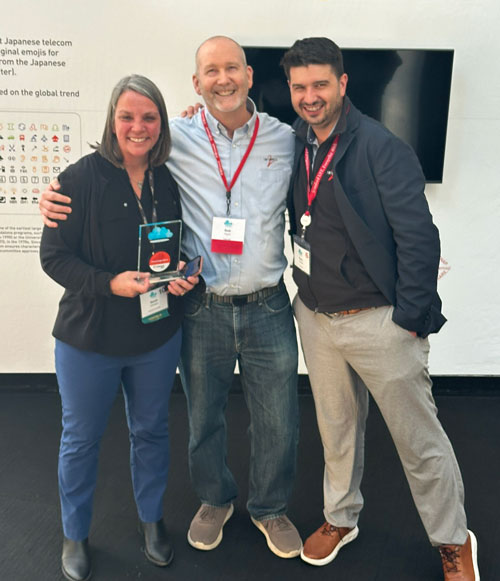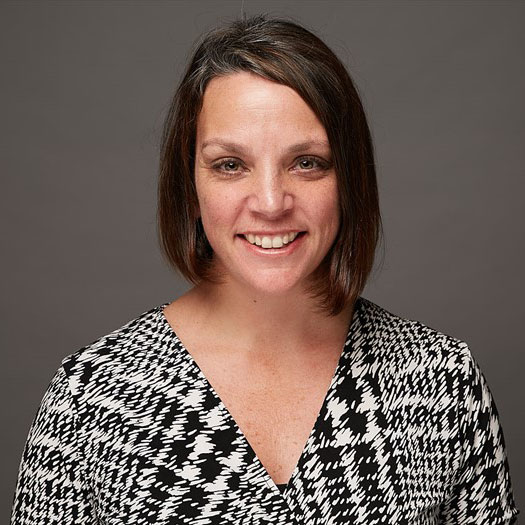Estimated reading time: 9 minutes
Cloud Superhero Spotlight
Editor’s Note: This conversation continues our series of interviews spotlighting the wonderful contributions that research and higher ed community members make to the NET+ Program.
Be on the lookout for additional interviews, and email amotley@internet2.edu if there’s a Cloud Superhero you would like us to spotlight in the future. We’re grateful for all our volunteers and appreciate all they do to move our work forward.
—Sean O’Brien – Associate Vice President, NET+, Internet2
Sure, two heads are better than one, but how about 90? This was the thinking that led to the convening of the very first Cloud Forum on Cornell University’s campus in 2015 when 45 institutions met in the Statler Auditorium, which seats 90 people max.
Cloud Forum founder Sarah Christen realized it was important for higher ed to have a collective and collaborative, but manageable, conversation about the cloud. “I knew the higher education community in and of itself was a supportive, collaborative community, and we could do better together than separately,” Sarah recalled. “So in the beginning, when I first started the Cloud Forum, that was the mindset. I can’t figure this out on my own, but I know some really smart people. Let’s figure it out together.”
Sarah has worked in all aspects of the IT organization in higher education, beginning with applications early on, moving to a cloud implementation role around 2015 and finally leading up to her current role as deputy chief information officer. Throughout Sarah’s 25-year career at Cornell, she has continued to be a curious and collaborative leader, remaining connected to the community she helped to foster.
Her contributions to the community were recognized at this year’s Cloud Forum (held April 30 – May 2 at Stanford University) where she received the 2024 Cloud Superhero Award. The award acknowledged her role as a visionary pioneer and leader in the higher education cloud community.
 Sarah is pictured here with Internet2’s Bob Flynn (center) and Sean O’Brien.
Sarah is pictured here with Internet2’s Bob Flynn (center) and Sean O’Brien.
We checked in with Sarah to get her take on the ever-evolving conversation about the cloud in higher ed, what’s ahead for the cloud in research and education (R&E), and the importance of fostering an active and vibrant community.
Continuing the Cloud Conversation
There’s never been a dull moment in the cloud or a shortage of topics to discuss. Sarah has witnessed first-hand how that conversation has shifted through the years as the concerns of the community changed and evolved.
“For the first couple of years of the Cloud Forum, it was CIOs or higher level staff attending, people who were trying to understand how to make the case at their institution to move to the cloud,” she explained. “We were all in this place where we had these huge data centers that were hitting capacity, and there was a lot of fear around the cloud, so it was really a strategic discussion about how to make the case for cloud at your institution. There were lots of conversations about that from a financial perspective.”
Once people had made the case for the cloud at their institutions, the dynamics of the conversation changed to focus on security. As Sarah noted, “At some point, it became clear that the opportunities to add layers of security were more robust in the cloud than anything we could ever do in our [on-premise] data centers.”
After a few years, the conversations shifted again to more technical discussions. “The last couple of years have been more technical and about how people are offering different types of services in the cloud,” Sarah observed. “There’s also been a lot of research in cloud conversations.”
“So one of the aspects I have loved about the forum is that the agenda for the meetings and for the discussions has changed based on what people needed at different times along their journey,” she continued, “and that just shows what a powerful sort of set of discussions it’s been for people.”
Implementing Ideas and Innovation
These days there’s a lot of diversity in the cloud, and the journey to implementation can take many paths. In her current role, Sarah manages two very separate cloud teams with different staff dedicated to different work.
“On the Weil campus, it’s far more research-focused. Probably 90% of what that cloud team does is support research computing,” she explained. “It’s very separate from the administrative computing on the Ithaca campus. The team on the Ithaca campus supports administrative applications and systems. They provide cloud consultation and some DevOps services to campus.”
Similar scenarios are occurring throughout the R&E community as institutions determine how best to balance their resources and priorities for the cloud. “We’ve figured out the administrative side,” Sarah said. “We know how to move things into the cloud, and we know how to do it securely. Research computing is still new enough that we need to better track it because of the cost; it’s not cheaper to run your research in the cloud yet.”
“There are some components of research in the cloud that make sense,” she continued, “but there are other components that people are still looking to put in data centers. And as a result, most institutions are seeing their data centers fill up again.”
“Even some things that had moved to the cloud for research are coming back to the data centers because the cost is high, and it’s difficult to control spending in the cloud sometimes,” she concluded. “This is a huge challenge for us, one that we can help the community better understand.”
Value in Volunteering
A desire for shared understanding and collective problem-solving are hallmarks of Sarah’s leadership. Her initiative in bringing that first group of institutions together at Cornell for the inaugural Cloud Forum was the start of her journey as a dedicated volunteer and member of the R&E cloud community.
Sarah serves on the steering committee of the Common Solutions Group. In addition, she is a member of the NET+ Cloud Services Technology Architecture Advisory Committee, the Internet2 Network Architecture, Operations & Policy Program Advisory Group, and the EDUCAUSE/Internet2 Joint Cloud Working Group. She is a past member of the NET+ Amazon Web Services Advisory Board.
Her motivation for being such an active volunteer? “Over the years the things that I’ve learned from the community have just been remarkable, and the things that I’ve been able to take from the discussions I’ve had and implement here within my teams has been huge,” Sarah recalled. “I also like to think that sometimes we have good ideas here at Cornell, and I like to be able to share them.”
This sharing of ideas and potential solutions to problems is what she calls “the power of combined brains.” Sarah sees incredible value in discussing a common problem in different ways. “We eventually all run into the same things. We’re just not that different,” she said. “And so, being able to discuss the common challenges that we have and come to common solutions on how to progress has resulted in us collectively moving together as opposed to us moving in 10 different directions, and that is super valuable to us as a community.”
Sarah acknowledged Internet2’s early – and ongoing – role in bringing the R&E cloud community together. “In my first cloud role, I started the Cornell Cloud Forum, and Internet2 was always involved in the event,” she said, “Over the years, Internet2 took on a bigger and bigger role, and then three years ago, began managing the Forum. It has been so great to be able to hand off the event and know that it will be taken care of in all the ways that are important to me.”
“In general, the cloud conversations that Internet2 has facilitated over the years through the Community Exchange and the Technology Exchange have been great,” she continued, “and the NET+ program helping to identify challenges with cloud contracts and how we across higher education can work together in that space has been really powerful as well.”

Fun Facts about Sarah
What She Likes Most About Her Job:
Throughout the time that I’ve been working at Cornell, I have been able to identify things that were interesting to me or areas that needed more focus within the organization or areas of opportunity. I have been able to navigate my career in a way that either I would be able to work on a project around those things or take a new position around those things. And as a result I’ve worked in all aspects of the IT organization in higher education. The thing that I like most is just that flexibility and opportunity to grow in areas where I have curiosity and enthusiasm. That’s pretty unique to higher education.
Best Advice About the Cloud:
You have these different skill sets within any given team. One of them is, I’ll just call it curiosity, enthusiasm, and that sort of thing, and another one is a desire to add structure to things. Those two skill sets are rarely seen in the same person, but combined are magic with regard to navigating new space. How do we be curious and learn new things and figure out how to use new technologies? But also, how do we create structure around it to help create a service or a process for campus to utilize? When building teams, even if it’s just a small project team, I make sure that I get both of those sides because curiosity will propel us in great ways, but that desire to add structure is also really important. Those people who are curious can fly down a path pretty fast and make some good progress. But if you don’t have somebody following up with the structure, it makes it hard to catch up.
And it’s important that the community continue working together. “Technology will continue to change, and as soon as we stop collaborating, then we’re all reinventing the wheel over and over again,” Sarah said. “Service providers are going to continue to innovate. They’re going to continue to come up with new ways to solve our problems.”
“It’s in our best interest to stay on the leading edge of that innovation rather than on the trailing edge of it,” she continued, “so the best way to do that is collectively as a community.”
You can be a superhero too!
Check out current opportunities to participate in NET+ working groups, service evaluations, and service advisory boards.
ICYMI